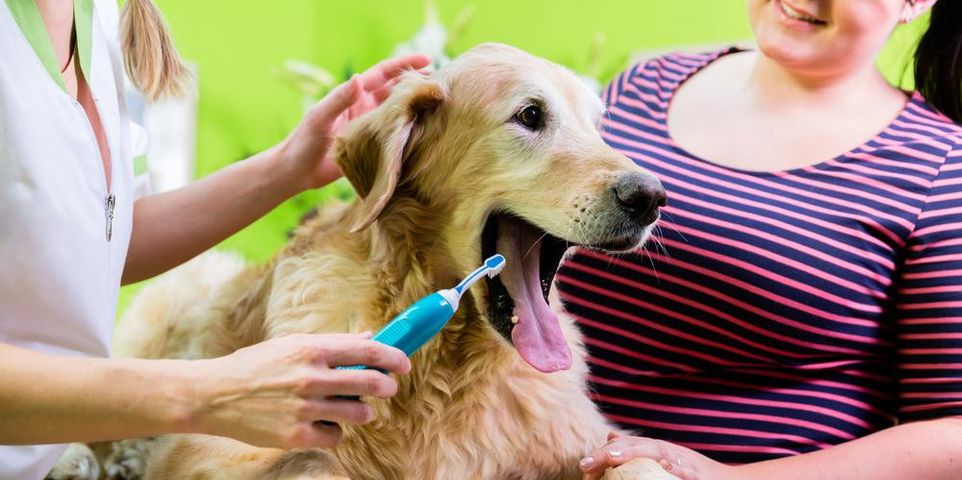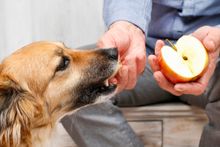What Causes Bad Breath in Dogs & How to Treat It Naturally

Bad breath, also known as halitosis, is a common issue for dogs—and their sloppy kiss-receiving owners. There are many reasons why your pooch may have less-than-pleasant breath, but some are much more dangerous than others. It’s a good idea to take your dog to the veterinarian to figure out what the issue is and how it should be handled. In the meantime, here are some of the most common causes of bad dog breath and natural remedies you can use to combat it.
Common Causes & Natural Treatments for Bad Dog Breath
What Causes Bad Breath?
Periodontal disease is the number one cause of halitosis in dogs. Just like humans, when too much tartar and plaque builds up, bacteria develops and causes bad breath. This can lead to periodontal disease over time. Other common causes of bad breath include respiratory problems, sinus inflammation, gastrointestinal issues, and unhygienic dietary habits such as trash consumption. When you notice your dog’s breath is becoming unusually smelly, take them to your veterinarian as soon as possible.
How Can You Treat It?
Depending on the cause, halitosis can be treated in a few different ways. If plaque and tartar, disease, or internal abnormalities are the culprit, your veterinarian will diagnose the issue and discuss your next steps for treatment. Periodontal disease is often tackled with a professional cleaning and possibly the removal of damaged or loose teeth. Less serious causes, such as diet and unhygienic habits, can be solved through routines at home.
One simple solution is to  make sure your dog is getting plenty of clean water. Thoroughly wash their bowl daily to prevent the growth of bacteria, and fill it with fresh water only. Apple slices and carrots make healthy snacks that can also do wonders for bad breath. These crunchy treats clean the plaque and tartar from areas dog toothbrushes have a hard time reaching. You can add small amounts of chopped mint or parsley to your dog’s food as well, which act as natural deodorizers that fight bacteria in the mouth and digestive system. Coconut oil has a myriad of benefits, including powerful antibacterial and anti-fungal properties that eliminate bad breath, and can be added in small doses to your dog’s food.
make sure your dog is getting plenty of clean water. Thoroughly wash their bowl daily to prevent the growth of bacteria, and fill it with fresh water only. Apple slices and carrots make healthy snacks that can also do wonders for bad breath. These crunchy treats clean the plaque and tartar from areas dog toothbrushes have a hard time reaching. You can add small amounts of chopped mint or parsley to your dog’s food as well, which act as natural deodorizers that fight bacteria in the mouth and digestive system. Coconut oil has a myriad of benefits, including powerful antibacterial and anti-fungal properties that eliminate bad breath, and can be added in small doses to your dog’s food.
Before you reach for any of these natural remedies, speak to your veterinarian first. It’s important not to go overboard, since any food in excess has the potential to be harmful. An animal hospital can advise you on proper doses and alternative treatments for your dog’s halitosis.
If your dog’s breath is becoming unbearable, take them to Greatwood Veterinary Hospital. This Richmond, TX, pet clinic is dedicated to providing personalized health care to every pet they treat. Whether your dog needs teeth cleaning and polishing, minor oral surgery, tooth extractions, or any other treatments for bad breath, these veterinarians can help. Call (281) 342-7770 or visit them online to learn more about their veterinary services.
About the Business
(63 reviews)
Have a question? Ask the experts!
Send your question

